Recent Treasure: The Gentleman by Forrest Leo
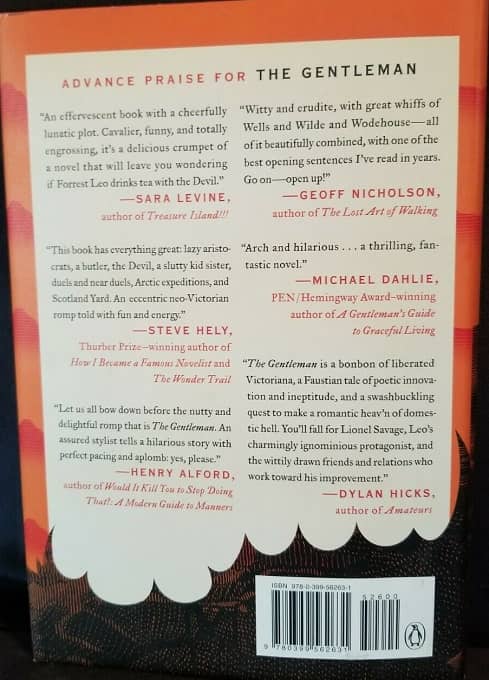 |
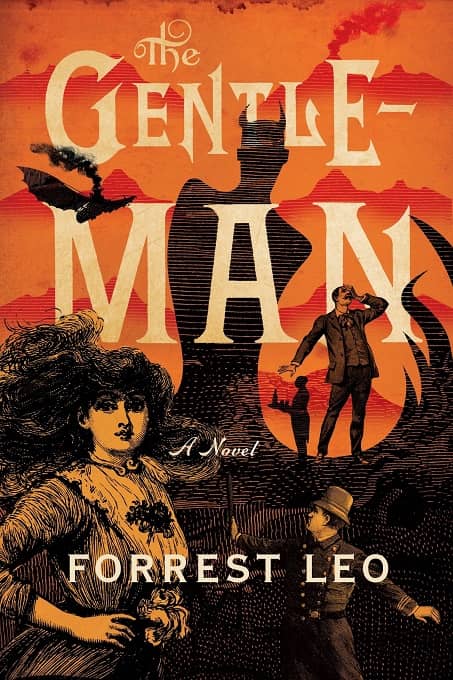 |
The Gentleman (The Penguin Press, hardcover, 2016). Artist unknown
The Gentleman appeared in 2016, and I completely failed to notice it. But recently my friend Hyson Concepcion recommended it to me in the context of SF or Fantasy set in Victorian (or Victorian-derived) times. She called it a “Neo-Victorian romp with the same commitment to historical accuracy as Black Adder.” Seems irresistible!
And it was! But in what ways will it appeal to Black Gate’s readers? I mean, from one angle this is a romance novel set in Victorian England. Which, mind you, is perfectly fine with me! But how about those readers who want some skiffy or fanty in their books? Well, then, what about a novel in which the literal Devil is a significant character? And one in which the protagonist spends much of the novel trying to find an entrance to Hell, in order to find the Devil and reclaim his wife? Surely that’s fantasy?
Oh, you say, I’d rather have some SF. Well, then, as long as steampunk works for you, how about a novel concerning a semi-secret society of British inventors, often suppressed by their government on the grounds that technological advances shouldn’t progress too quickly? (Plus – a flying machine!)
Well, sure! So it is Fantasy, right? With a smidgen of SF? Yes, but it’s also a true-blue love story. And it’s a madcap comedy featuring a Jeeves-like butler! And it contains an extended debate about the merits of free verse versus iambic pentameter!
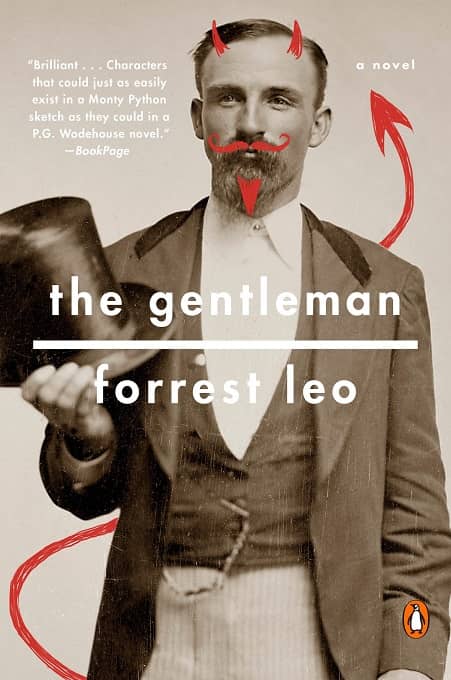 |
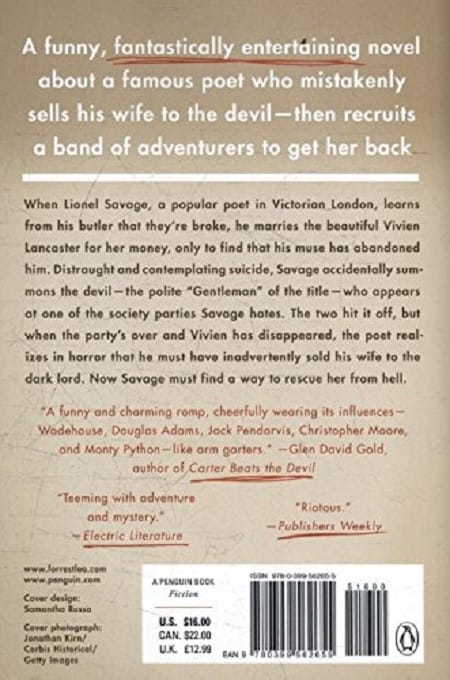 |
The Gentleman (Penguin Books trade paperback, 2017). Cover design by Samantha Russo
Plus, there are footnotes. Lots of footnotes. Fun footnotes. All these the product of the man trusted to bring the book to publication, Hubert, the cousin of the main character’s estranged wife … and Hubert’s voice and character come through beautifully, despite his minimal presence until the end.
So, what’s going on? What’s the plot??? Lionel Savage is a moderately successful poet from a prominent English family. But … as his butler, the redoubtable Simmons, must inform him one day, he’s quite broke. So naturally he goes looking for a wealthy young woman to marry, and settles on Vivien Lancaster, who is very beautiful and very rich. And now, some months later, he’s in despair. For he finds Vivien very vapid. And, worse, his poetic muse has deserted him. He considers suicide, but then a curious man shows up … who turns out to be the Devil. (The Devil has taste, and he tells Lionel that he prefers to call Hell Essex Grove.) They have a nice conversation, and Lionel at least decides not to kill himself. Then, the next morning, he can’t find Vivien. And he realizes he must have sold her to the Devil as a solution to his problems.
He quickly realizes that won’t do. And that becomes all the clearer when a couple more people show up – one of them his 16 year old sister Lizzie, who has been expelled from her school for a “dalliance” with the Dean’s son. (Which makes her more sexually experienced than her older brother, who never has consummated his marriage to Vivien.) Lizzie is understandably perturbed when she learns that Lionel is married, and didn’t tell her. Plus she’s perturbed that her old bedroom has been given to Vivien. Then Vivien’s brother Ashley also appears. He’s a very famous explorer … but he got into trouble when he discovered El Dorado, and then Shangri-La, and now he’s on the track of Atlantis.
So, who better to discover a way to Hell? But how to get there … well, probably an inventor who might be working on a flying machine … and where is Hell? Consult a bookseller …
It’s all a great deal of fun. The basic twists are guessable enough, but I won’t reveal them here. There’s a lot of fun discussing inventions, and travel, and poetry (whether to call the Gentleman the Devill or the Dev’l (depending on how it scans) is a plot point), and of course love.
I’ve mentioned that this is a love story, and a fantasy, with SF elements, and set in a semi-plausible version of our history … but most of all it’s a comedy. The main comparison you’ll find in reviews is to P. G. Wodehouse, which is fair, but much motivated I think by the butler character, Simmons, and his vague similarity to Jeeves. Monty Python is also mentioned, more for the absurdity of some of the action.
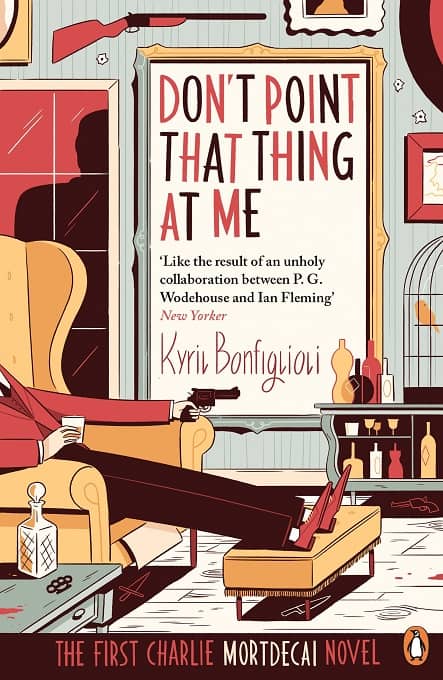 |
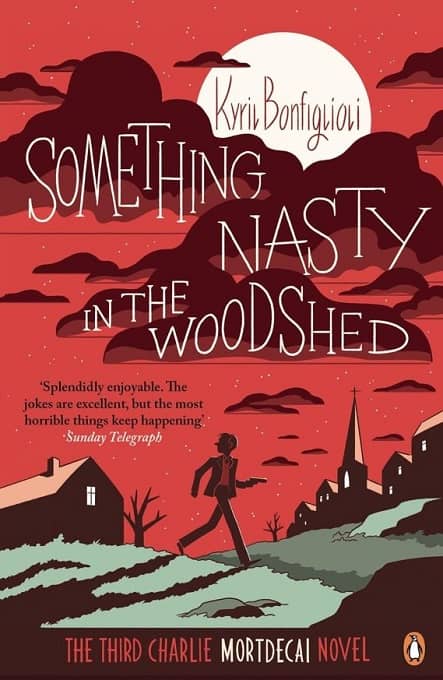 |
Two of the four Mortdecai novels by Kyril Bonfiglioli: Don’t Point That Thing at Me
(Penguin, 2014) and Something Nasty in the Woodshed (Penguin, 2014)
But I was reminded of Kyril Bonfiglioli’s Mortdecai books as well – for the madcap action and something about the voice. That said, Mortdecai is altogether a meaner character than anyone in this book – like Wodehouse, especially since there are no Aunts in evidence, The Gentleman has no villains, not even the Dev’l. What it is though is a thoroughgoing pleasure. Frothy? Yes. Silly? Sometimes. But there are times – perhaps especially now! – when frothy and silly are just the thing. Especially if you are the sort of person, as I am, who fully understands the source of Lionel’s economic predicament as depicted in this exchange with Simmons:
“I don’t buy anything except books. You cannot possibly tell me I’ve squandered my fortune upon books.”
“Squander is not the word I would have used, sir. But it was the books that did it, I believe.”
Rich Horton’s last article for us was “An Evocation of the Science Fiction Dream of Exploration: “The Star Pit” by Samuel R. Delany.” His website is Strange at Ecbatan. Rich has written over a hundred articles for Black Gate, see them all here.
This was sounding interesting until you made the Bonfiglioli comparison. Several years ago I was given Don’t Point that Thing at Me by a friend who was convinced I would love it. And I really didn’t. Life is like that sometimes…
Well, Thomas, I am a fan of Bonfiglioli’s books (he was once editor of SCIENCE FANTASY, by the way.) But there is one significant difference between his work and THE GENTLEMAN: Charlie Mortdecai is actually rather a nasty person. Nobody in this book is really nasty. So it may still work for you!
But, as ever, sometimes books just don’t land with some readers, and it’s not anybody’s fault.
Speaking of ‘you might also like’, consider the fabulous Johannes Cabal series by Jonathan Howard.
Think Bonfiglioli and Moorcock both worked together as editors at some stage. I know Moorcock did ‘New Worlds’ so I’m guessing Bonfiglioli’s gig was ‘Science Fantasy’? Moorcock liked him but was ambivalent about him as an editor.
There’s four Mordecai books? I always thought there was only three. I read ‘Something Nasty in the Woodshed’ first (I think it won the Golden Dagger Award that year). It’s a classic of its kind. I read the first two books years later and found them anti-climatic by comparison, maybe because they’re so tonally different – they just weren’t what I was expecting.
Yes, Bonfiglioli did SCIENCE FANTASY (with a great deal of help from Keith Roberts.)
The fourth Mortdecai book was completed over a decade after Bonfiglioli’s death by Craig Brown (in 1999.) I bought it, started it, didn’t really get into it, but probably didn’t give it a full chance.
I also like his All the Tea in China, also a comic novel, a sea story about one of Mortdecai’s distant ancestors.
Black Adder you say… ok i’ll give it a shot